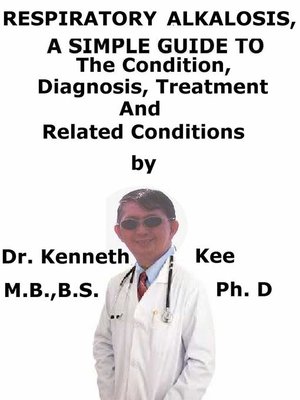Respiratory Alkalosis, a Simple Guide to the Condition, Diagnosis, Treatment and Related Conditions
ebook
By Kenneth Kee

Sign up to save your library
With an OverDrive account, you can save your favorite libraries for at-a-glance information about availability. Find out more about OverDrive accounts.
Find this title in Libby, the library reading app by OverDrive.



Search for a digital library with this title
Title found at these libraries:
| Library Name | Distance |
|---|---|
| Loading... |
This book describes Respiratory Alkalosis, Diagnosis and Treatment and Related Diseases
Respiratory alkalosis is a disorder caused by a low level of carbon dioxide in the blood because of breathing excessively (main cause).
Respiratory alkalosis happens when the patient breathes too fast or too deep and carbon dioxide levels fall too low.
This induces the pH of the blood to rise and become too alkaline.
Breathing too fast can induce a person to go into respiratory alkalosis.
This happens when a person's pH level is higher than 7.45.
Causes
A person may breathe too fast because of anxiety, overdosing on certain medicines, or using a ventilator.
Frequent causes are:
1. Anxiety or panic
2. Fever
3. Over-breathing (hyperventilation)
4. Pregnancy (this is normal)
5. Pain
6. Tumor
7. Trauma
8. Severe anemia
9. Liver disease
10. Overdose of certain medicines, such as salicylates, progesterone
Any lung disease that results in breathlessness can also produce respiratory alkalosis (such as pulmonary embolism and asthma).
Panic attacks and anxiety are the most frequent causes of hyperventilation.
They are not the only possible causes.
1. Heart attack
2. Pain
3. Drug use
4. Asthma
5. Fever
6. Chronic obstructive pulmonary disease
7. Infection
8. Pulmonary embolism
9. Pregnancy
At its simplest definition, respiratory alkalosis almost always indicates that a person is breathing so fast that they are getting rid of excess carbon dioxide.
Carbon dioxide is an acid.
Because of this carbon dioxide loss, the body's pH may be more alkaline, the opposite of acidic.
Since some of the body's processes function in a tightly regulated range of pH levels, it is important that people keep a pH balance that is close to normal.
In some cases, a doctor may believe that having a more alkaline pH less dangerous than having an acidic one.
Some causes of respiratory alkalosis can be high-risk and need more urgent medical attention.
Doctors will normally classify the possible causes of respiratory alkalosis into 3 categories.
All of these causes hyperventilation, or breathing too fast.
These 3 categories are:
A. Related to a medical condition
Various medical disorders can cause respiratory alkalosis such as:
1. Atrial flutter
2. Panic disorder
3. Liver disease
4. Pneumothorax, which happens when air in the pleural cavity induces a collapsed lung
5. Pulmonary embolism
6. Overdose of salicylate medications, such as aspirin
Pregnancy can also produce respiratory alkalosis.
This is because a woman is likely to breathe faster during the third trimester due to the needs of the growing fetus.
B. Accidentally induced
Occasionally, a person receiving breathing support through a ventilator may show signs of respiratory alkalosis.
This indicates that the ventilator is supplying too many breaths, or breaths that are too large, and the person exhales out extra carbon dioxide.
C. Purposefully induced for therapy
If a person has a disorder that produces acidosis, a doctor may make modifications to their ventilator settings to try to help him or her breathe out the excess carbon dioxide.
This can help get a person's pH levels back to normal.
Diagnosis is when when a person's pH level is higher than 7.45.
Treatment
Patients with hyperventilation syndrome can benefit from reassurance, re-breathing into a paper bag during acute episodes, and treatment for underlying psychological anxiety.
Sedatives and...







